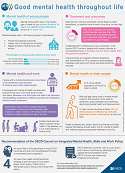Health
Mental Health
|
Mental ill-health can have devastating effects on individuals, families and communities, with one in every two people experiencing a mental illness in their lifetime. During the COVID-19 crisis many people’s mental health worsened; at the worst points in the crisis prevalence of depression and anxiety increased significantly, and even doubled in some countries. Mental ill-health also weighs heavily on societies and economies; the economic burden of mental ill-health can rise to up to 4% of GDP, and those with mental illness have poorer educational, employment, and physical health outcomes than those in good mental health. Yet, as many as 67% of people still say they do not get the mental health support they need. OECD work on mental health looks at how to deliver more effective mental health support in health systems, and through a whole-of-government approach. |
|
|
Find out more about the impact of COVID-19 on mental health: |
|
A New Benchmark for Mental Health Systems - Tackling the Social and Economic Costs of Mental Ill-Health
|
|
Mental ill-health affects millions of people, and drives economic costs of more than 4% of GDP. A good mental health system helps people stay in good mental health, and connects those in need to appropriate support to manage their mental health condition or even fully recover from it. However, mental health care has long been neglected and under-funded, and unmet need for care is still high. The long-lasting COVID-19 crisis and the toll it is taking on mental health has made mental health systems more important than ever. This timely report provides an in-depth analysis of how well countries are delivering the policies and services that matter for mental health system performance. The report highlights recent reforms countries have taken to strengthen mental health performance, including by increasing access to mental health care, ensuring that service users take the lead in planning and even delivering services, and prioritising integration and mental health promotion. The report also identifies promising approaches countries should pursue to better meet their populations’ mental health needs. This report sets up a framework for understanding mental health performance through internationally comparable indicators, an approach set to grow stronger still in the coming years as more data become available.
|
Integrated Mental Health, Skills and Work Policy
Tackling mental ill-health of the working-age population is a key issue for labour market and social policies in OECD countries. OECD governments increasingly recognise that policy has a major role to play in keeping people with mental health problems in employment and helping them to perform at work, in bringing those outside of the labour market into it or back to it, and in preventing mental illness at all ages including youth and adolescence.
- Read our latest report Fitter Minds, Fitter Jobs - From Awareness to Change in Integrated Mental Health, Skills and Work Policies (November 2021)
- Learn more about Mental health and work and access the latest reports and data
- Contact Mr. Christopher Prinz ([email protected]) in the OECD Skills and Employability Division for further information
The Patient-Reported Indicator SurveyS (PaRIS) initiative
 |
Health systems know very little about whether the health care delivered seeks to improve people’s well-being and their ability to play an active role in society. It is only when we measure outcomes reported by patients themselves – such as quality of life – that important differences in the outcomes of care emerge. The OECD Patient-Reported Indicator Surveys (PaRIS) initiative addresses these critical information gaps and aims to develop international benchmarks of health system performance as reported by patients themselves, and includes a focus on collecting the experiences and outcomes of users of mental health care services. This new international survey will focus on patients with one or more chronic conditions, including mental health conditions such as depression or anxiety, who are living in the community and who are largely treated in primary care or other ambulatory care settings.
Read the latest articles published in International Journal for Quality in Health Care, Volume 33, Issue 1, 2021: - Patient-reported indicators in mental health care: towards international standards among members of the OECD, March 2021
|
Other OECD work on Mental Health
 |
Improving mental health care in Lithuania The Ministry of Health of Lithuania has requested technical assistance from the European Commission and the OECD to support the reform process on mental health care and to support Lithuania in their efforts to strengthen community-based mental health care. As part of the project, the OECD organised a virtual expert workshop on 17-18 February 2022, to bring together leaders in community-based mental health care over two half-day sessions, and present the preliminary findings of the OECD on the situation of mental health care in Lithuania.
|
- Health at a Glance: Europe 2018 says that mental health problems, such as depression, anxiety disorders and alcohol and drug use disorders, affect more than one in six people across the European Union in any given year. Besides the impact on people’s well-being, the report estimates the total costs of mental ill-health at over EUR 600 billion – or more than 4% of GDP – across the 28 EU countries. Read the special chapter Promoting mental health in Europe: Why and how? and the OECD Factsheet: Promoting Mental Health
- For children and young people today, being online and using social media have become an integral part of their lives. This reliance on digital technology has fuelled concerns from parents, teachers, governments and young people themselves that digital technologies and social media are exacerbating feelings of anxiety and depression, disturbing sleep patterns, leading to cyber-bullying and distorting body image. As the rapid take-up of digital technologies and social media by children and young people continues, it is crucial to adopt an approach that minimises the risks without restricting the considerable opportunities and benefits digital technologies and social media have to offer. Read our Policy Brief on Children & Young People’s Mental Health in the Digital Age - Shaping the Future
FURTHER READING
|
Access our Mental Health Facts and Figures infographics |
CONTACT US
- Ms. Emily Hewlett: [email protected]
 Follow us on Twitter via @OECD_Social
Follow us on Twitter via @OECD_Social
Related Documents


